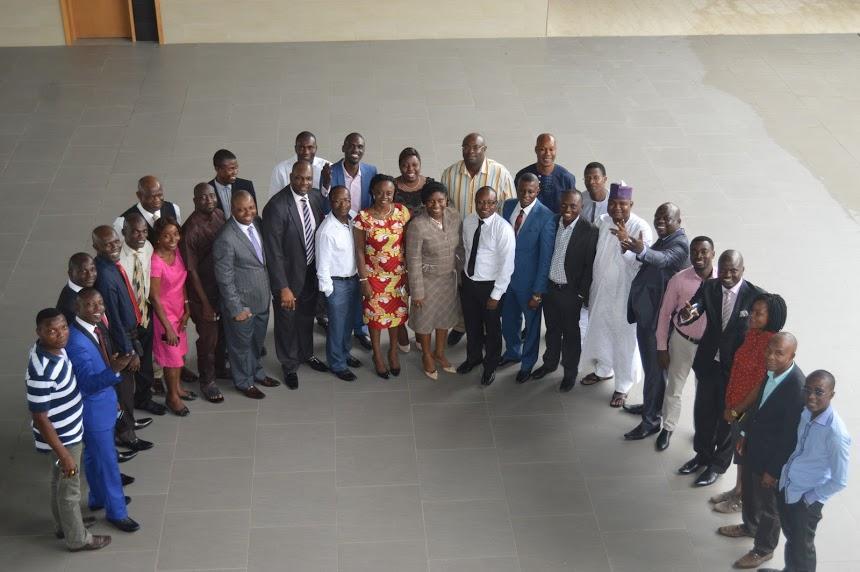
Citizen Apathy, Opacity, Funding Big Issues for Nigeria Energy Media
A reform-minded, NRGI-led oil and gas sector immersion for Nigerian journalists in Lagos closed Friday, 1 July.
The Master Class in Oil and Gas Reporting, a program of the NRGI in partnership with the School of Media and Communication, Pan-Atlantic University, taught 25 mid-level journalists about the sector across the value chain and addressed natural resource governance challenges. This month’s exercise was the most recent edition of media training in Nigeria.
Master Class in Oil and Gas Reporting participants
January participants in a related NRGI master class said their reporting was bolstered by the experience, and that their focus on oil and gas governance reforms was honed.
Businessday Newspaper’s Olusola Bello said reform of NNPC—with no transparent processes to track revenue flows from the company to government coffers—should top the priority list of media reporting.
“It is no longer news that NNPC needs to be restructured to curtail revenue loss, fix its accountability and transparency issues,” Omatseye Oti of Newsbreakers said.
“We need to answer how and why the metering system still does not work, for instance… instances of misappropriation [and] diversion of resources at NNPC is worth reporting over and over again,” Oti said. She added that the failure of regulatory bodies to curb tax evasion by oil companies is another important issue media need to bring to the fore.
Daniel Adugbo, who writes for Daily Trust, believes Nigeria’s “resource curse” is the country’s most important story. There are frequent petrol shortages, evidenced by the recent episodes of long lines at gas stations. (Many Nigerians resorted to roadside black markets selling at double the official pump price.) Nigeria’s inability to refine sufficient crude oil for local consumption is tied to this. Local refining could indirectly lead to job creation and industrial growth, Adugbo said.
This Day energy reporter Chineme Okafor said that a major resource governance issue is citizen apathy and lack of engagement.
“There is an attitude of fatalism. It’s never going to be better,” said Okafor. “People just want basic services and opportunities to do stuff and survive,” said Okafor. Kunle Ajayi, senior photojournalist with the Independent, agreed.
Adugbo also said Nigerians are not paying enough attention to how resources were allocated at the community and local government levels.
Transparency in the upstream and downstream sectors is a key topic Nigerian journalists should highlight, said Punch Newspaper’s Bayo Akinloye. Knowing how Nigeria’s oil and gas regulatory and legal frameworks have worked toward maximizing citizen benefit from sector activities could be important, Akinloye said.
Several journalists said the course has helped them approach their reporting differently amidst media industry challenges.
Frank Uzegbulum, an editor for Businessday Nigeria’s West Africa Energy, says accessing data and credible sources are the biggest challenges he faces. Uzegbulum said the January course has helped him better appreciate and practice data-backed reporting. His story “Saudi Arabia and Iraq fighting Nigeria for Indian crude oil market share” was inspired by learning points from the course.
Many journalists said that limited reporting funds to exhaustively cover resource governance issues in Nigeria is another hindrance. But through all this, Adugbo says the January course is helping him navigate the terrain. He has learned to craft new story angles from seemingly trivial resource governance issues. More importantly, Adugbo said, NRGI experts have been mentoring him in governance issues.
Adugbo is most proud of the stories he has produced after the course as these reflect his learning points, including: “Fuel scarcity looms over import delays, dollar scarcity”; “NNPC remains behind in manpower, profitability”; and “Fuel queues rise after Kachikwu’s comments.”
Olusola says the course helped him to rethink his writing style and ask harder questions. His story on Nigeria’s refineries is one example; while writing the story, Olusola said he was more concerned about the governance question than he would have previously.
Participants from June’s course—held at a critical period in resource governance in Nigeria—will also offer their perspectives on the NRGI training.
Toyin Akinniyi is a media capacity development associate with NRGI.

